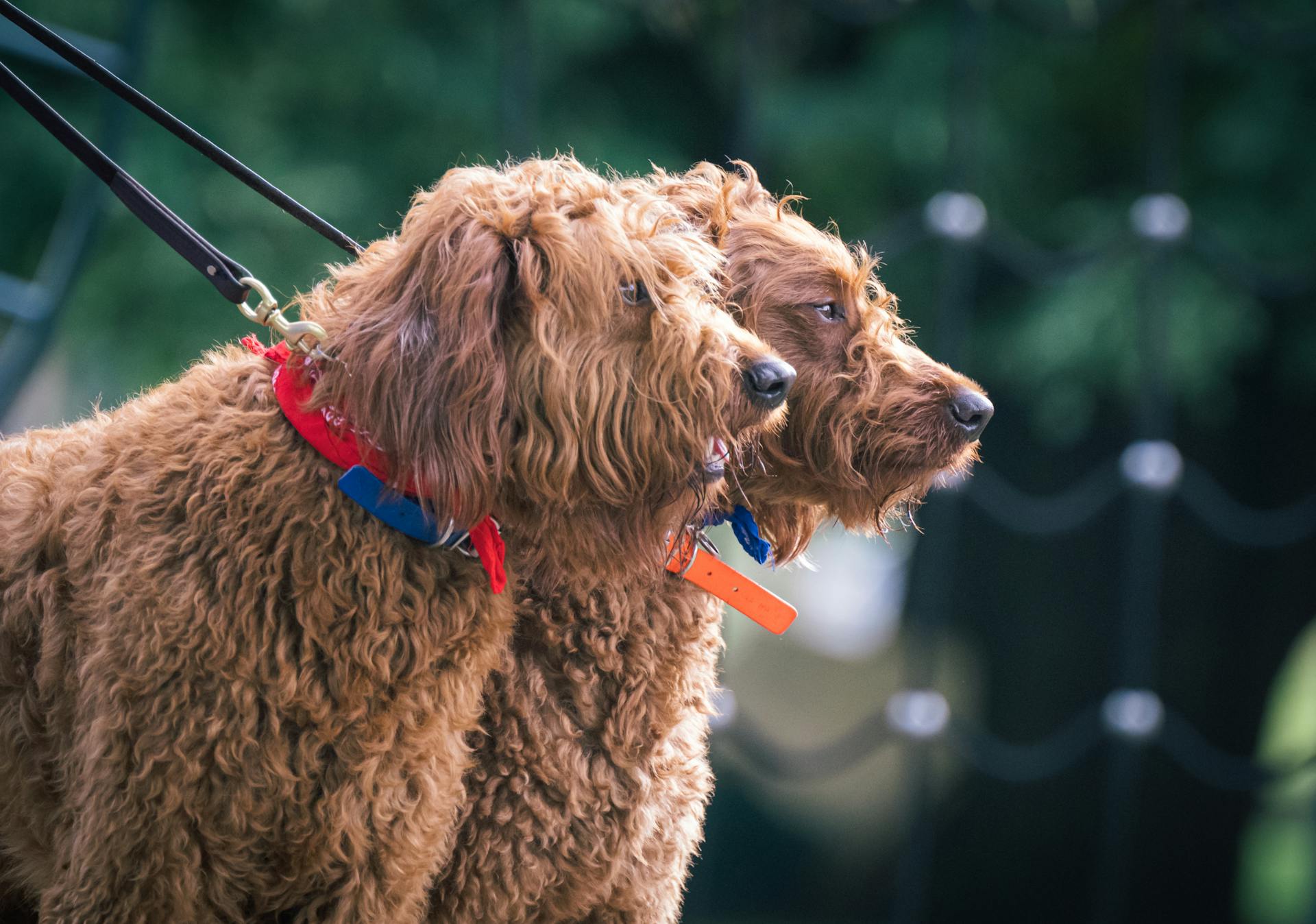
Labradoodles and Goldendoodles are two popular hybrid breeds that have captured the hearts of many dog lovers. They're both known for being intelligent, friendly, and low-shedding, making them ideal for families and people with allergies.
Labradoodles are often considered to be more energetic and require more exercise than Goldendoodles. This is because Labradoodles tend to inherit the high energy levels of their Labrador Retriever parent.
Goldendoodles, on the other hand, tend to be more laid-back and adaptable, making them a great choice for families with smaller living spaces. They're also known for being more food-motivated, which can make training a bit easier.
In terms of size, Labradoodles can range from 18-24 inches in height and weigh between 50-80 pounds, while Goldendoodles typically range from 15-20 inches in height and weigh between 40-60 pounds.
Origins and History
The origins of Labradoodles and Goldendoodles are rooted in their lineage, with Labradoodles being a cross between a Labrador Retriever and a Poodle, and Goldendoodles being a cross between a Golden Retriever and a Poodle.
Labradoodles were first introduced to the Royal Guide Dog Association of Australia in 1989 by breeder Wally Conron as a viable breed for service dog work.
The Australian Labradoodle was developed in the early 1990s in Australia, making it a more suitable breed for service dog work compared to the traditional Labradoodle.
The Poodle's influence in both breeds is significant, as it provides a low-shedding coat that makes them an excellent choice for families with allergies.
The breeding of Goldendoodles became popular in the 1990s, with the goal of producing a family-friendly canine that would be suitable for people with allergies.
There are different generations of Labradoodles and Goldendoodles, including F1, F1B, and others, which can affect their characteristics and suitability for certain purposes.
A fresh viewpoint: Goldendoodles and Allergies
Physical Characteristics
Labradoodles can vary significantly in their appearance, depending on whether the Labrador or the Poodle genes are more dominant. They usually have a shorter, wirier coat that comes in a variety of colors, including black, chocolate, and cream.
Labradoodles are generally broader in stature than Goldendoodles and have a more muscular build with a more angular head. Their coarser coat can be a notable difference from the Goldendoodle's coat.
Goldendoodles, on the other hand, have a softer coat and a round head. They often have a more slender build, which can make them a more athletic dog than the Labradoodle.
Worth a look: Jack Russell Deer Head Chihuahua Mix
Appearance
Labradoodles and Goldendoodles can be tricky to tell apart, but there are some key differences in their appearance.
Labradoodles can come in a variety of colors, including black, chocolate, and cream, and have a shorter, wirier coat.
Their build can also vary, but generally, they are broader in stature than Goldendoodles.
They often have a more muscular build with a more angular head, which can be a distinguishing feature.
Goldendoodles, on the other hand, tend to have a slightly lighter build and a heavily feathered tail.
Their coat is often softer and more appealing to the touch, and they usually have a round head.
Labradoodles may have a coarser coat than Goldendoodles, which can be a notable difference.
Goldendoodles can make a more athletic dog than Labradoodles due to their slender build.
A fresh viewpoint: Deer Head Chihuahua Mix
Coat Texture and Allergy Considerations
Goldendoodles can have flat, straight, wavy or curly coats, which require specific grooming needs.
Their coats can vary greatly in texture, but most are considered hypoallergenic, meaning they're less likely to trigger allergic reactions.
Each coat type has its own unique characteristics, and some are more low-maintenance than others.
Labradoodles, on the other hand, can have straight hair coats, shaggy fleece coats, or wool coats, all with different grooming needs.
No dog breed is completely hypoallergenic, but these breeds are popular among pet owners with allergies due to their friendly nature and hypoallergenic characteristics.
Broaden your view: Are Australian Labradoodles Hypoallergenic
How Big Do They Get?
Goldendoodles and Labradoodles come in different sizes, including standard, miniature, and medium versions. Standards typically range from 21 to 23 inches high for females and 22 to 24 inches high for males.
The miniature version is quite tiny, measuring 14 to 16 inches high.
Standards are the heaviest, weighing anywhere between 50 and 65+ pounds.
Miniatures can weigh as little as 15 pounds or as much as 30 pounds.
Medium Labradoodles typically weigh anywhere from 30 to 50 pounds.
Temperament and Personality
Labradoodles are known for their friendly and energetic nature, making them excellent family pets. They inherit the Labrador Retriever's love for people and activity, making them great companions for outdoor adventures.
Labradoodles are highly intelligent and trainable, which makes them a great choice for families with active lifestyles. They are also extremely loyal and get along well with children and other dogs.
Goldendoodles, on the other hand, are often described as gentle, affectionate, and incredibly social. They share the Golden Retriever's love for human companionship, making them perfect for families.
Goldendoodles tend to be more laid-back and calm, making them better suited to families who prefer a quieter lifestyle. They are still great with kids and other pets and make excellent therapy dogs.
Both Labradoodles and Goldendoodles are very social dogs that enjoy spending time with their owners. They are highly intelligent and eager to please, making them easy to train.
Take a look at this: Goldendoodles of Love
Labradoodles have a high energy level, which makes them great for families with outdoor activities. They also have a sixth sense about what's happening, making them well-suited for busy homes or homes that get a lot of visitors.
Goldendoodles, on the other hand, are great at making friends easily and quickly. They are also highly intelligent and can figure things out quickly.
Neither Labradoodles nor Goldendoodles are suited to serve as guard dogs due to their overly friendly demeanor. They are both perfect for families who want a lovable companion.
Health and Longevity
Labradoodles and Goldendoodles are generally healthy breeds, but like all hybrids, they can inherit health issues from their parent breeds. Regular veterinary check-ups and a healthy lifestyle are essential for any dog's well-being.
Labradoodles are more prone to ear infections, epilepsy, allergies, and Addison Disease. Goldendoodles frequently encounter hip and elbow dysplasia, allergic dermatitis, thyroid issues, and cataracts.
Despite potential health issues, Doodle breeds benefit from hybrid vigor, where mixed-breed dogs have less health problems due to their genetic diversity. This is a significant advantage of choosing a Labradoodle or Goldendoodle as a pet.
Check this out: Corgis Mixed with Other Breeds
Nationwide Pet Insurance found that Goldendoodles are far less likely to have claims filed for cancer than their parent breeds. This is a reassuring fact for prospective owners.
Labradoodles are more prone to hip and elbow dysplasia as well as eye problems like cataracts and progressive retinal atrophy. Goldendoodles could be more prone to heart issues, just like their ancestors, the Golden Retriever.
With proper care, the typical life span of a Labradoodle is 15 years, making this breed an excellent choice for a long-term companion.
Bathing and Grooming
Both Labradoodles and Goldendoodles require regular grooming to keep their coats healthy and prevent matting. They are low-shedders due to their Poodle heritage, but still need regular care.
Labradoodles often need more frequent brushing, at least a few times a week, to manage their dense and sometimes woolly coats. Goldendoodles require daily to weekly brushing to prevent matting, especially for those with curlier coats.
The bathing routine for both breeds is similar, with every 4-6 weeks being standard. However, Labradoodles may require more frequent baths if they have a more active lifestyle.
Both breeds require professional grooming every 6-8 weeks to keep their coat manageable and tidy. This includes haircuts to maintain coat length.
Here's a comparison of the bathing and grooming needs of Labradoodles and Goldendoodles:
Regular ear care and nail trimming are also essential for both breeds, with Goldendoodles requiring monthly nail trimming and Labradoodles needing nail trimming every 3-4 weeks.
Exercise and Training
Both Labradoodles and Goldendoodles require regular exercise and training to thrive. They have high energy levels and need to stay physically and mentally active.
Labradoodles are relatively easy to train due to their high intelligence, and they enjoy active engagement and mental stimulation. Consistency, patience, and positive reinforcement are key when training this breed.
Goldendoodles need to start training early to learn good behavior and social skills, and they react positively to reinforcement and take pleasure in mastering new tricks and commands.
Worth a look: Training Labradoodles
Exercise Needs
Regular exercise is essential for your dog's physical and mental well-being. Labradoodles and Goldendoodles need regular exercise, with Labradoodles requiring longer walks due to their higher energy levels.
Labradoodles tend to have higher energy levels than Goldendoodles, which means they need more physical activity to stay happy and healthy.
Training
Training is a vital component of pet ownership, and Doodles certainly require it. With their high intelligence and eagerness to learn, both Goldendoodles and Labradoodles can be trained relatively easily.
Consistency, patience, and positive reinforcement are key when training a Goldendoodle. They need to start training early to learn good behavior and social skills.
Labradoodles, on the other hand, are also easy to train, but they may occasionally display stubborn streaks. Being firm and consistent is essential when training a Labradoodle.
To establish a positive relationship with your Labradoodle, it's essential to avoid yelling or making gestures that could be interpreted as threatening. Your dog needs to know it can trust you.
Curious to learn more? Check out: Labradoodle

One way to establish yourself as the leader of the pack is to be careful not to give your dog too many treats. A treat should only be given when your Labradoodle follows a command.
Setting expectations helps ease anxiety and ensures that your canine companion knows what to expect while living with you. A schedule from the time it's a puppy is ideal.
Teaching your Labradoodle to wait patiently is one of the most important things you can teach it. If you teach your dog to wait, you can avoid jumping and other undesirable behaviors in the future.
To teach your Labradoodle to wait, show it a treat and then ask it to sit and wait. If the dog runs toward you, paws at the treat, or jumps on you, take the treat away.
You might like: Labradoodle vs Standard Poodle
Frequently Asked Questions
Are Labradoodles or Goldendoodles curlier?
Labradoodles tend to have curlier coats, while Goldendoodles often have wavier and softer coats. If you're curious about the differences, our girls are a great example!
Sources
- https://inkopious.com/blogs/articles/labradoodle-vs-goldendoodle-what-are-the-differences
- https://centralillinoisdoodles.com/blog/labradoodles-vs-goldendoodles/
- https://goldendoodles.net/labradoodle-vs-goldendoodle-which-is-the-perfect-pet/
- https://www.prideandprejudoodles.com/labradoodle-vs-goldendoodle/
- https://www.labradortraininghq.com/labrador-breed-information/labradoodle-vs-goldendoodle/
Featured Images: pexels.com


